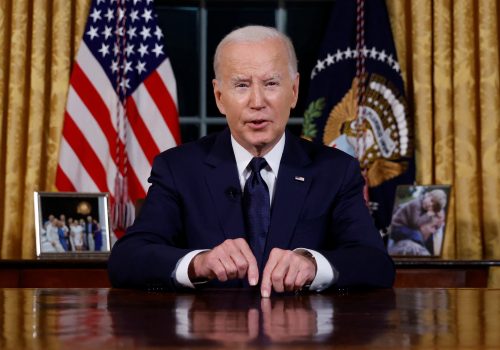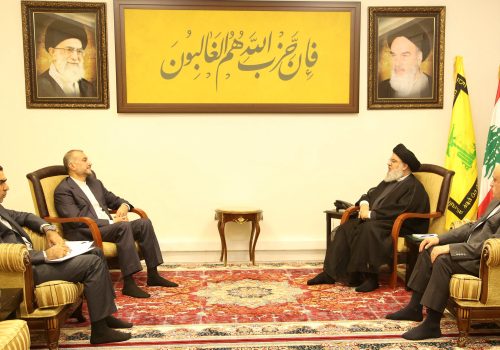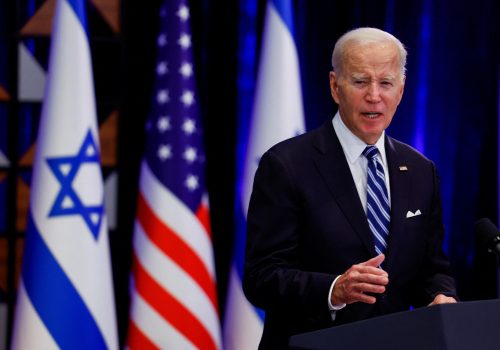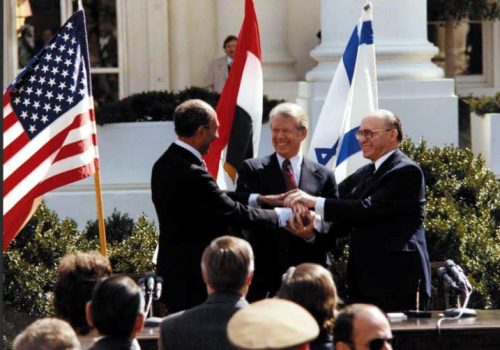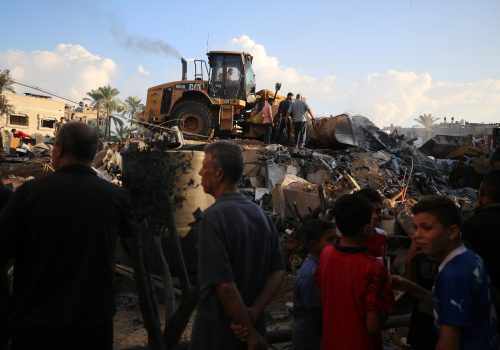Live expertise: The latest insight as Israel prepares for a ground invasion of Gaza
In the aftermath of Hamas’s brutal October 7 attack on Israel, the Israeli government appears set for a ground invasion of the Gaza Strip with the goal of completely destroying the terrorist organization. Meanwhile, the ongoing Israeli siege of Gaza has set off a dire humanitarian crisis, with more than a million Gazans displaced as the Israeli government ordered residents to evacuate from the enclave’s north.
Atlantic Council experts are keeping close watch on the ongoing Israel-Hamas war and on the reactions around the globe. As the conflict continues into its second week, find the latest updates below.
Click here to get caught up on last week’s expert analysis.
The latest updates
THURSDAY, OCTOBER 19 | 9:53 PM WASHINGTON
Experts react to Biden’s ‘inflection point’ address on Ukraine and Israel
Biden’s second bravura presidential moment in two days is a legacy-builder
It has been a good week for Joe Biden. In a tour de force, he visited Israel and delivered a pitch-perfect message of support for its embattled people and some careful observations on how to deal with the challenges ahead. Then one day after that trip, he gave a powerful speech from the Oval Office laying out the major dangers presented to global order, vital US interests, and US leadership by Vladimir Putin’s aggression to subdue Ukraine and Hamas’s savage attack on Israel. US presidents are usually elected for reasons related to the economy and other domestic issues, but presidents often establish their legacy at moments of international peril.
Even before Putin launched his massive invasion of Ukraine in February of 2022, the Biden administration laid out a sensible policy to deter Russia and then to make sure it did not succeed: 1. major sanctions on Russia; 2. political isolation of Russia; 3. the provision of substantial military and economic support to Ukraine; and 4. strengthening NATO defenses in the east. It took great effort to implement this successfully.
But one thing the White House had not done was to explain to the American people why the United States was leading this major effort. Biden checked that box tonight. He explained that if Putin wins in Ukraine, he might march west and attack our NATO allies, which the United States would be obliged to defend. He reminded the American public that Ukraine was only asking for the means to defend itself. Providing the military and economic assistance that Ukraine needs is therefore the smart and economical way to protect the United States and its allies. He pointed out that if Putin wins in Ukraine, it would also embolden aggressors elsewhere. That would erode American leadership. He noted too that Ukraine and Israel are democracies attacked by authoritarians bent on their destruction. Stopping them is consistent with our values as Americans.
To help defend our interests, the president noted that he was sending a request to Congress for substantial aid to Ukraine and Israel, and he expected us to overcome our divisions in dealing with these challenges. That aid is essential to defend American interests, and his handling of it was a smart, statesmanlike way to address the disorder in the US House of Representatives.
It was Biden’s second bravura presidential moment in two days. In its clarity, strategic focus, and sunny summons of American values and leadership, it recalled Ronald Reagan at his best. This is good for Biden and better for us.
—John E. Herbst is the senior director of the Atlantic Council’s Eurasia Center and a former US ambassador to Ukraine.
Biden rallies Americans as global defenders of democracy. Will it work?
Biden’s Oval Office address to the nation sought to answer one central question regarding the conflicts between Israel and Hamas and Russia and Ukraine: “Why should the American people care?” Against the domestic political backdrop of a speaker-less Republican Party, a barely avoided government shutdown, and a deeply divided nation, Biden sought to unify the American people as global defenders of democracy.
The rhetoric was about more than drawing important parallels between the wars in Ukraine and Israel. Biden is hoping that his message will compel lawmakers—under pressure from their constituents—to pass the forthcoming package of direct military aid to both nations that he previewed tonight. An omnibus aid package could offer something for a spectrum of Israel supporters and Ukraine skeptics alike. Or, alternatively, some could weaponize its sticker shock to draw the nation inward. But this is where Biden’s appeal for support rightly extended beyond the theoretical: Just twelve days after Hamas’s terrorist attack on Israel, American Jews and Muslims have begun to face heightened threats to their safety as a result of anti-Semitic and Islamophobic violence across the nation—with deadly consequences already in Illinois, where a six-year-old Palestinian-American child was brutally murdered for his faith.
The big question is whether Biden’s case was strong enough to move Republican lawmakers reluctant to cede any perceived win to a president with just thirteen months to go in his quest for reelection. The unity that the United States experienced after the 9/11 attacks seems a distant memory. Can Biden, who has invoked 9/11 to describe the aftermath of Hamas’s terrorist attack in Israel, summon the same resolve that followed that national trauma? The forthcoming funding request will serve as a test, and US allies and foes alike will be watching to see if the United States passes it.
—Jenna Ben-Yehuda is the executive vice president of the Atlantic Council, and the former president and chief executive officer of the Truman National Security Project and the Truman Center for National Policy.
Read more expert reactions to the Oval Office address:
THURSDAY, OCTOBER 19 | 5:13 PM WASHINGTON
Smart in 60 Seconds: What to expect from Israel’s possible ground invasion of Gaza
THURSDAY, OCTOBER 19 | 3:05 PM WASHINGTON
Israel misread Iran’s way of war. A proper understanding could help predict Hezbollah’s next moves.
In perhaps the Israeli political echelon’s first—and, to date, highest ranking—admission of failure to preempt the October 7 Hamas-led attack on southern Israel, National Security Council chairman Tzachi Hanegbi said misunderstanding the group’s intentions was “my mistake, first and foremost.” Hanegbi explained that Israel “believed Hamas internalized the lessons” of Operation Guardian of the Walls “when it was dealt a heavy blow” in 2021.
As proof, he pointed to Hamas’s seeming indifference to Palestinian Islamic Jihad’s (PIJ) “pleas for help”—as he put it—when PIJ clashed with Israel in August 2022 and May of this year. “Hamas decided to remain outside the battle,” Hanegbi said. Though accurate on a technical level, Israel’s analysis of Hamas’s intentions, as reflected in Hanegbi’s statement, demonstrates a fundamental failure in understanding how Iran and its proxy forces operate, cooperate, and make war.
Iran’s proxies have long ceased to work as geographically contained entities or in isolation. Particularly with the onset of the Syrian civil war, Tehran has worked on integrating its various extensions and proxies into a mutually reinforcing and symbiotic regional alliance—a true “Axis of Resistance.” This also applies to Hamas, both within the Palestinian Territories and outside them.
Read more from David Daoud, nonresident fellow at the Atlantic Council’s Rafik Hariri Center and Middle East Programs and director of Israel, Lebanon, and Syria Research at United Against Nuclear Iran:
THURSDAY, OCTOBER 19 | 10:24 AM THE HAGUE
A welcome announcement on humanitarian aid for Gaza
Today’s announcement that Israel will allow Egypt to deliver limited quantities of aid to Gaza was a positive step forward in what has otherwise been a bleak humanitarian situation during a ten-day siege on the territory. While the exact determination of what duties Israel has turn on a legal classification of the conflict, the laws of war are at least clear on the basics: there is at a minimum an obligation to allow humanitarian assistance to be delivered to the civilian population by an impartial and non-discriminatory humanitarian organization if refusal to do so would result in mass starvation. With the United Nations warning that water shortages in Gaza have now “become a matter of life and death,” and the conflict is exacerbating the already precarious nature of life in Gaza, where more than 60 percent of the population faced food insecurity, it is imperative that the new announcement stick.
Given the clearly deteriorating situation in Gaza, and the extremely rare statement issued by the International Committee of the Red Cross that the denial of food, water, and electricity to civilians, crucial for their survival, is not compatible with international humanitarian law, it is evident that humanitarian assistance delivered by impartial and non-discriminatory humanitarian organizations must be allowed to enter Gaza. Israel’s approval of the entry of humanitarian aid to Gaza from Egypt, following Prime Minister Benjamin Netanyahu’s hour-long meeting with US President Joe Biden, is a step in the right direction. At the same time, it is also important to ensure that this life-saving aid actually makes it to the intended recipients—civilians—and that Hamas does not divert or seize aid. As the commentary to Article 23 of the Fourth Geneva Convention reminds us, “constant surveillance is necessary to ensure that the articles are in actual fact received by those for whom they are intended and that any illegal trafficking is made impossible.” But even that cannot be carried out if the aid is not allowed to enter as soon as possible. The survival of civilians depends on it.
Read more from Lisandra Novo, staff lawyer for the Strategic Litigation Project at the Atlantic Council:
WEDNESDAY, OCTOBER 18 | 8:55 PM WASHINGTON
The Israel visit was just the start. Here’s what Biden needs to do next.
Biden arrived in Tel Aviv far more popular among Israelis than Prime Minister Benjamin Netanyahu, over whom he has significant leverage as a result. In the days following this visit, Biden should not hesitate to use this leverage, though he must do so wisely.
Given this context, the United States has core objectives that are public, military, political, and diplomatic. By his very presence, Biden clearly demonstrated US resolve and friendship to Israelis. His words reinforced this core message. He was willing to put the credibility of the United States on the line to support the Israeli narrative on the recent deadly explosion at the hospital in Gaza City, a critical action given the lack of Israeli credibility among many global audiences. Given the trend lines in the region and in Europe, this in and of itself made the trip worthwhile. But if this is all that emerges from the trip in the end, then it will have been largely a missed opportunity.
Outside observers don’t know the details of the military matters that were discussed when Biden met privately with the Israeli war cabinet—and let’s hope secrets can actually be kept on this subject. But here’s what I would have advised Biden to put on the table. First, in the weeks and months ahead, there must be no daylight between the United States and Israel when it comes to the specifics of the requests for US military assistance. It would be a mistake if the United States were to give Israel a proverbial blank check only for a narrative to develop, as has been the case with Ukraine, that the administration is reluctant to provide what is desired. And differences on this subject should be resolved behind closed doors.
Read more from William F. Wechsler, senior director of Middle East Programs at the Atlantic Council and former US deputy assistant secretary of defense for special operations and combatting terrorism.
WEDNESDAY, OCTOBER 18 | 4:55 PM WASHINGTON
Experts react: What did Biden achieve in his visit to Israel?
Amid strong show of support, Biden delivers a tough but necessary message to Israel
Biden delivered yet another passionate, personal speech in Israel on Wednesday reaffirming his continued unwavering support for Israel and its grieving population as it confronts Hamas in Gaza. But he also showed that he can stand firmly behind Israel while simultaneously delivering difficult messages calling for caution and humanitarian support.
Among an ambitious list of priorities—from deterrence to American hostages—Biden used the trip to secure an agreement for humanitarian measures that Israel must take as it wages war in Gaza, announcing a surprise one hundred million dollar assistance package to Gaza and the West Bank—small but symbolic in the context of the wider aid that will go to assisting Israel in its war with Hamas. Biden reminded Israel in no uncertain terms that it is both Jewish and a democracy and it must meet its responsibilities as such. Israel, he reminded the country, believes in fundamental human rights and must act accordingly.
Biden is uniquely positioned to pressure Israel on these issues. Through his incredible embrace of the country, Biden has secured the leverage and good will to deliver tough if necessary messages to Israel that it must act according to Western standards as it engages in war. And in so doing, no one in Israel can ever accuse the United States of abandoning the country or its security needs. To the contrary, Biden was met in Israel with a hero’s welcome: At a moment when Netanyahu faces abysmal approval ratings in Israel, Biden, the first US president to travel to Israel during a war, was welcomed by posters that read “Thank You, Mr. President.” Both the public and Israeli press has been overwhelmed—“verklempt”—with his support for the nation in what is arguably its darkest hour. This is in direct contrast to his Democratic Party predecessor Barack Obama, whose cool and detached response to Israel during wartime was met with an equally chilly response from Israelis. Biden’s firm messages in Tel Aviv today about Israel’s rights and responsibilities may be a tougher pill to swallow than the message he delivered to the American people last week when the war broke out, but there is no better leader to deliver them credibly to the Israeli people.
—Carmiel Arbit is a nonresident senior fellow for Middle East Programs and the Scowcroft Middle East Security Initiative at the Atlantic Council.
9/11 is the right analogy—for the wrong reasons
At this morning’s joint news conference, Israeli Prime Minister Benjamin Netanyahu described Hamas’s October massacre as “twenty 9/11s” relative to the population of Israel and the United States. He also spoke of a battle between “the forces of civilization and the forces of barbarism,” echoing the diagnosis made by the George W. Bush administration after the September 11 attacks.
There are of course close parallels between the two traumas, not least the element of strategic surprise, the asymmetric balance of power, the deliberate mass murder of civilians, and the shattering of prevailing myths about dominance and omniscience.
Unfortunately, the analogy risks running deeper than Netanyahu intends. The United States pursued a maximalist response after 9/11, invading Afghanistan and occupying Iraq, without a clear exit strategy or an (achievable) definition of success. This violence unleashed a tsunami of radicalization across the Middle East that continued to drive the threat, bringing the fringe ideology of the perpetrators into the mainstream of a newly destabilized region and inadvertently confirming some of its canons. The elements of dehumanization in the United States’ response to 9/11, both systematic and spontaneous, unraveled global faith in the US-led rules-based order, precipitated a moral crisis at home, and helped to reshape domestic politics in profound and unexpected ways.
The Israeli armed forces have promised “hell” in Gaza, already dropping six thousand bombs in five days on the small territory, cutting off food, water, medicine, and electricity to the population, and amassing three hundred thousand Israeli troops for a probable ground invasion—with, seemingly, no plan for the day after it is all over. Its airstrikes have killed 3,300 Palestinians, one third of whom were children, a reality which will both devastate and radicalize, and perhaps fuel further savage attacks. Dehumanization is also at work in Israel’s response and is deeply ensconced within official narratives, with Israeli Defense Minister Yoav Gallant observing that “we are fighting human animals and we will act accordingly,” a former prime minister protesting “are you seriously asking me about Palestinian civilians… we’re fighting Nazis,” and members of parliament calling for a second Nakba and the use of nuclear weapons against Gaza. This all may portend a moral crisis for Israel, as well as a deepening of international skepticism about the intentions of the West.
Using a slightly smaller figure than Netanyahu, Biden agreed in his afternoon remarks that the Hamas attack was “like fifteen 9/11s,” but he also recognized that “we made mistakes after 9/11” and cautioned Israel not to be consumed by rage in its own decision making. Whether this much-needed corrective has come in time will be seen in the coming hours and days. But what is certain is that, for millions of people across the Middle East and beyond, 9/11 and its aftermath serve as a deeply troubling—and triggering—precedent.
—Alia Brahimi is a nonresident senior fellow within the Atlantic Council’s Middle East Programs.
Read more expert reactions to Biden’s visit to Tel Aviv.
WEDNESDAY, OCTOBER 18 | 3:19 PM WASHINGTON
Peacemaking can follow the Israel-Hamas war. History shows it.
The leaders of Israel, the Arab states, and the United States should take some critical lessons from past conflicts. True statesmen do not fight wars just to kill more adversaries than their own people lose through fighting. No one can doubt that Israel can kill many times more Palestinians than the number of Israelis that the militant group Hamas killed and took hostage on October 7. The United States has the military means to help Israel do that. However, the real test of leadership is to turn the tragedies of conflict into peacemaking.
Egyptian President Anwar Sadat understood that. When he launched a surprise attack in October 1973—along with Syria and eventually a coalition of other Arab states to recover territories lost to Israel after Israel’s own surprise attack in June 1967 wiped out most of the Egyptian air forces—I was part of the State Department team that helped Secretary Henry Kissinger’s diplomacy bring Egypt and Israel to a standoff and a ceasefire. Sadat did not accept that status quo, leaving Israel to occupy the Sinai Peninsula. Instead, the Egyptian president found innovative ways to reach out to both the United States and Israel, culminating with his historic visit to Jerusalem to address the Israeli Knesset.
President Jimmy Carter took it from there. He brought Sadat and Israeli Prime Minister Menachem Begin to Camp David in September 1978 for twelve days of secret talks that led to the March 26, 1979 peace treaty between their two countries, known as the Camp David Accords.
Read more from David Mack, nonresident senior fellow with the Atlantic Council’s Middle East Programs, former deputy assistant secretary of state for Near East affairs, and former US ambassador to the United Arab Emirates.
WEDNESDAY, OCTOBER 18 | 2:57 PM ABU DHABI
Dispatch from Abu Dhabi: Do the Israelis know about the Basus War?
The government of the United Arab Emirates (UAE) has great sympathy for the Palestinian people, but it is clear-eyed about Hamas, which it has long recognized to be a terrorist organization. Therefore, it was unsurprising that the UAE, joined by its Abraham Accords partner Bahrain, would issue the Arab world’s strongest condemnations of Hamas soon after October 7. They referred to Hamas’s escalation as “serious and grave” or “dangerous” for the region, and the UAE specifically noted that it was “appalled” by Hamas taking Israeli citizens as hostages, while Bahrain issued a “denunciation” of the kidnappings. In contrast, their neighbor Qatar declared “Israel alone is responsible for the current escalation”—a view that is sadly much more representative of the Arab street. And given how vocal the UAE has been in promoting the Abraham Accords over the last three years, the government feels especially exposed and vulnerable to shifts in Arab public opinion now.
A senior government official here told me that they were proud of that statement—the feeling I heard from many here was that it was the right thing to do. That said, they also knew in advance that the cost for positioning the UAE as “a voice of reason”—another phrase I heard repeated several times—would not be cheap. And in both domestic and pan-Arab social media the country is paying that price today. At the same time, UAE officials have also made clear that economic ties between Emiratis and Israelis would continue despite the coming war and that, as Emirati Minister of State for Foreign Trade Thani bin Ahmed Al Zeyoudi put it, “We don’t mix the economy and trade with politics.”
Read more from William F. Wechsler, senior director of Middle East Programs at the Atlantic Council and former US deputy assistant secretary of defense for special operations and combatting terrorism.
WEDNESDAY, OCTOBER 18 | 2:20 PM WASHINGTON
Network of South Asian Twitter accounts spreading Israel-Palestine war disinfo
The DFRLab identified at least twenty-five accounts on X, the platform formerly known as Twitter, that appear to be coordinating to spread copy-and-pasted messages about the ongoing Israel-Palestine conflict. Many of the accounts claim to be based in India, though their precise location cannot be determined. They previously focused on India-related topics before switching to posting false, misleading, and divisive content in support of both Israel and Palestine, sometimes jumping back and forth within a series of posts.
Israel declared war against Hamas after the militant group launched an unprecedented attack on Israel on October 7, 2023. At the time of writing, the war had resulted in the death of over 3,600 lives on both sides, and the displacement of approximately one million people – almost half of Gaza’s population. Social media content has circulated rapidly since the start of the conflict, and platforms have been flooded with disinformation and misinformation. X has faced criticism for concerns that the platform allows the spread of false information and graphically violent footage.
Fact-checking website BOOM recently reported on verified Indian accounts on X spreading false information and inflammatory content about the conflict, using similar tactics to the accounts found by the DFRLab.
Read more from the Atlantic Council’s Digital Forensic Research Lab.
WEDNESDAY, OCTOBER 18 | 11:00 AM CAIRO
Egypt, the United States, and Israel are in a stalemate over opening the Gaza-Egypt border
On October 16, Israeli aircraft reportedly bombed the Rafah border crossing between Gaza and Egypt, which Israeli forces appear to have done several times now since October 7. The attack sparked outrage in Egypt, with some activists tweeting that the bombardment of the only possible crossing out of Gaza would hamper relief efforts and stop humanitarian aid from reaching Palestinians who had fled to the south to escape the incessant shelling of northern Gaza and an expected ground offensive.
Before Israel’s latest bombardment of the crossing, expectations were high that the gateway would reopen to allow the evacuation of foreign nationals, including at least five hundred US citizens in Gaza. A reopening would also allow for food and medical supplies to enter southern Gaza, as had reportedly been agreed to in negotiations between the Egyptian and US sides during US Secretary of State Antony Blinken’s October 15 visit to Cairo. But the bombing of the sole exit point from Gaza into Egypt has dashed hopes of a breakthrough anytime soon. A source on Egypt’s side of the border who spoke to me on condition of anonymity, said that the bombing was certain to block—at least temporarily—the delivery of badly needed humanitarian assistance to entrapped Palestinians and may likely delay the evacuation of foreigners.
US-Egyptian relations are already tense after Cairo refused to cave in to US pressure to allow one million Palestinians to enter Sinai. Egypt’s national security council convened on October 15 and declared that it categorically rejects the US and Israeli proposal to take in Palestinians fleeing the war, arguing that such a move would undermine national security. Egyptian President Abdel Fattah el-Sisi had earlier stated that the Palestinian issue cannot be resolved at the expense of other parties and that negotiations were the only way forward. Speaking on condition of anonymity, a security source said to me that Egypt “will not play a part in the forced displacement of Palestinians.”
But with food, fuel, water, and other basic necessities quickly running out in Gaza, civilian deaths may likely surge in the coming days, piling even greater pressure on the Egyptian leadership. On October 16, Israeli Prime Minister Benjamin Netanyahu’s office denied that an agreement had been reached for a ceasefire in southern Gaza and for the transfer of humanitarian assistance into Gaza in exchange for the evacuation of foreign nationals. Israel had earlier warned that trucks carrying relief supplies would be bombed if they tried to enter Gaza without coordination with the Israeli side. It seems that the situation is at a stalemate, with both Egypt and Israel standing their ground.
Meanwhile, the death toll for Palestinians continues to rise each day, and the threat of other parties, such as Iran, opening a new front against Israel in the war on Hamas is also growing by the minute—compounding the risks of destabilizing the region.
—Shahira Amin is a nonresident senior fellow at the Atlantic Council’s Scowcroft Middle East Security Initiative focusing on Egypt, economics, energy, water access, and women’s issues.
WEDNESDAY, OCTOBER 17 | 1:07 AM WASHINGTON
Biden arrives at the very moment Israel needs its closest ally
US President Joe Biden arrives on Wednesday in an Israel still reeling from Hamas’s brutal terrorist attack, but also in a broader Middle East irate over the tragic strike on the al-Ahli Baptist Hospital in Gaza City that reportedly killed hundreds. Biden’s trip was always designed to highlight, in the most direct manner possible, public support for Israel. But the trip took on additional symbolic significance after media reports and statements by Arab countries and Turkey condemned Israel for the attack—despite Israel’s denials of involvement in the explosion at the hospital.
Arab residents across the region took to the streets in protest against both Israel and the United States. Never mind that there was no factual confirmation that Israel was responsible for the blast at the hospital, regional press and social media declared it to be true. Against the backdrop of Arab states, even friendly ones, whose publics are far more hostile to Israel than their leaders are—and whose publics made clear Tuesday night that they will not allow their kings and presidents to be neutral toward, let alone supportive of, Israel over the coming weeks and months of the war—Biden’s visit highlights again the criticality of the US alliance.
Biden was privately probably planning to use this trip to understand Israel’s strategic endgame in Gaza or push Jerusalem to figure out what it should be. Now, following the hospital’s destruction, there will be an additional goal. If Israel turns out to ultimately be responsible for the strike, then we should expect the private conversations to also be an early test of how much leverage and goodwill Biden truly has with Prime Minister Benjamin Netanyahu, as Biden may seek to coax Netanyahu to ease restrictions in Gaza and allow greater access to basic needs.
Conversely, if Israel verifies that it was a Palestinian Islamic Jihad (PIJ) rocket that destroyed the hospital, then Biden will have a level of greater moral authority—especially after Jordanian King Abdullah II, Egyptian President Abdel Fattah al-Sisi, and Palestinian Authority President Mahmoud Abbas canceled on him—to try to cajole those leaders to help the dire humanitarian situation in Gaza by opening up their borders at a time when it is the last thing they want to do, out of fear for their own countries’ security. It probably won’t work, but he has a greater chance if PIJ is responsible for the strike and not Israel.
But no matter who is responsible, the demonstrations across the Arab world showed that Israel is in for a long, hard battle not just on the ground in Gaza, but in the public eye of the Middle East. It encapsulates why Israel so often feels so alone in the world and why Biden’s decision to visit is even more important than it was when originally announced.
— Jonathan Panikoff is the director of the Scowcroft Middle East Security Initiative in the Middle East Programs and a former deputy national intelligence officer for the Near East at the US National Intelligence Council.
TUESDAY, OCTOBER 17 | 8:52 PM WASHINGTON
The cancellation of the Biden summit reveals Jordan’s juggling act
Today, Jordan’s longstanding position as a US ally and arbiter with the Palestinians in times of crisis faced its ultimate test. As images of the carnage in al-Ahli Baptist Hospital in Gaza began to circulate on the world’s screens, protests erupted in Arab and Muslim capitals. In Amman, protestors attacked the Israeli embassy late into the night, and videos on social media appeared to show Jordanian police trying to control the angry crowds with tear gas and rubber bullets. Within hours, the protests had spread to other parts of the country. As the strongest condemnations from Arab capitals began to emerge, Jordan was in an unenviable position as it was set to host a summit with US President Joe Biden, Egyptian President Abdel Fattah al-Sisi, and Palestinian Authority President Mahmoud Abbas on Wednesday.
The Jordanian government’s response became progressively stronger as images of the horrors in the al-Ahli hospital were beamed across televisions and social media channels and the number of casualties rose well into the hundreds. A strongly worded condemnation from the foreign ministry was followed by a statement from King Abdullah II, who called it a “massacre” and “heinous war crime” and warned that the war will drag the whole region into a catastrophe. Less than an hour later, Jordan announced three days of official mourning for the Palestinian “martyrs,” followed soon after with an official announcement that Jordan will no longer host the planned summit.
Jordanian officials were quick to read the Arab street—images of protests from Tunisia to Istanbul were being projected alongside images of Gazans amidst the carnage in al-Ahli Baptist Hospital, which was initially reported widely in Arab and some Western outlets as the result of an Israeli attack. Claims from Israeli official sources denying responsibility and blaming Palestinian militant groups fell on deaf ears in the Arab street.
Hosting Biden in the aftermath of what may be the deadliest attack on a hospital ever documented would have been disastrous for Jordan domestically, as the United States has taken the strongest position among global powers in siding with Israel in the aftermath of the October 7 Hamas attack. For the majority of the Arab world, the US position is seen as a double standard, as it failed to condemn at all Israel’s ongoing assault on Gaza’s civilian population and its displacement of hundreds of thousands of them.
For Jordan, it must juggle domestic anger and frustration over Israel’s actions against its Palestinian neighbors while maintaining its relationship with the United States and its nearly thirty-year peace agreement with Israel. Both Jordan and Egypt will find themselves in a difficult position as they try to untangle the most serious crisis to face the region since the Arab spring a decade ago. The implications for regional spillover, Jordan’s large border with Israel, and its furious population, including Palestinian refugees and citizens of Palestinian origin, present the biggest threat to the country’s stability and security in decades.
—Tuqa Nusairat is the director of strategy, operations, and finance for the Atlantic Council’s Rafik Hariri Center & Middle East Programs.
More updates:
TUESDAY, OCTOBER 17 | 7:05 PM WASHINGTON
This may be the single deadliest attack on a hospital ever documented
Reports of a strike on al-Ahli Baptist Hospital in Gaza City that killed hundreds and destroyed the hospital, according to Gazan health officials, are devastating. This may be the single deadliest attack on a hospital ever documented, an appalling statistic considering the hundreds of hospital attacks in Syria and Ukraine in the past decade. Initial reports stated the bombing came from an Israeli airstrike, while Israel has since stated that militants with Islamic Jihad misfired a rocket that hit the hospital.
While it is too early to offer a legal determination on this specific attack, it is worth reinforcing the laws of war related to the protection of hospitals, which both the Israel Defense Forces and Hamas are bound by.
In addition to the general protection accorded civilians, hospitals receive additional protection under the laws of war. In many cases, targeting a hospital is a war crime, according to the Geneva Conventions, the Rome Statute of the International Criminal Court, and customary international law.
There are extremely limited circumstances, with four strict requirements, when an attack directed at a hospital would not violate the laws of war:
- The hospital must be used outside of its medical purpose to commit acts harmful to the attacking force. Use of the hospital for a military purpose—for instance, sheltering able-bodied combatants or launching attacks—meets this requirement. Treating wounded or sick combatants, storing munitions taken from sick or wounded, or guarding a hospital does not.
- The attacking force must give advance warning of the attack. If feasible, the warning must set a reasonable time to cease the military operations in the hospital or evacuate civilians.
- Any attack must be proportional: the resulting harm to civilians—considering both near-term direct and longer-term indirect casualties—cannot be excessive in relation to the concrete and direct military advantage anticipated.
- If the military advantage from the attack can be achieved through any other feasible means with decreased harm to civilians, the less harmful means must be pursued instead.
It will take time to determine exactly what happened to al-Ahli Baptist Hospital. But current credible reporting indicates that the hospital is well-established with a readily identifiable location and was known to be providing essential medical services amid a siege resulting in shortages of medical care and conflict that has caused thousands of casualties. It is hard to imagine any facts that could justify the destruction of al-Ahli Hospital and reported killing of hundreds of people inside.
—Elise Baker is a staff lawyer for the Strategic Litigation Project and previously documented attacks on hospitals in Syria.
TUESDAY, OCTOBER 17 | 10:25 AM WASHINGTON
Understanding Iron Dome and Israel’s need for layered defense
Between October 7 and October 10, Hamas militants fired more than 4,500 rockets from Gaza into Israel, according to an estimate by the Israel Defense Forces (IDF). Early reports indicate that Hamas fired almost half of these rockets during the opening hours of the attack on October 7. Massed rocket launches of this nature can overwhelm ever the most formidable air defenses.
Looking back to the previous rounds of Hamas rocket fire from Gaza into Israel, Israel’s Iron Dome air defense systems achieved an estimated 90 percent intercept rate in 2021 and an estimated 97 percent intercept rate in 2022. On October 7, Hamas’s massed rocket fire made it impossible for Iron Dome to have the same level of success. The reason why is based on the nature of how all missile-based air defense system are limited by the number of their “loaded” interceptor-missiles. If the number of incoming rockets outnumber the Iron Dome’s loaded interceptors, then rockets can strike targets inside Israel. Notably, there is also a time delay to reload an Iron Dome battery that fired off all its interceptors. Thus, even the best air defense can be overcome.
Importantly, the United States provides funding and technical assistance to help Israel field one of the world’s most capable integrated air defense networks, of which Iron Dome is one layer. The layered defenses protecting Israeli airspace include the Iron Dome short-range system, David’s Sling medium-range system, Israeli purchased Patriot air defenses, and Arrow-2 and Arrow-3 long-range systems. With the threat that an expanded conflict poses to Israel, US funding and US-Israeli technical cooperation become even more important. With the IDF and Lebanese Hezbollah exchanging fire across the Blue Line demarcation between Israel and Lebanon, Hezbollah could cause significant harm to Israel if it were to wait for the IDF to begin its ground operation into Gaza and then unleash its stockpile of more than one hundred thousand rockets and missiles against Israel.
This threat was clearly on the mind of US President Joe Biden when he warned against Iran or its proxies intervening in the conflict and subsequently approved the first Carrier Strike Group to the eastern Mediterranean. Equally important, Israeli and US officials didn’t wait for this recent crisis to begin to work on an additional layer of protection for Israel’s air defense network. Israel has been in the process of finalizing the development of the Iron Beam, a high-energy laser weapons system that will allow Israel’s other air defense systems to preserve their limited quantities of interceptors. Importantly, Iron Beam development is occurring in partnership with the US defense industry and was something that Biden highlighted during his July 2022 visit to Israel.
—Daniel E. Mouton is a nonresident senior fellow at the Scowcroft Middle East Security Initiative of the Atlantic Council’s Middle East Programs.
MONDAY, OCTOBER 16 | 9:40 PM WASHINGTON
Arabs and Muslims in the US braced for the worst. Then it happened in Chicago.
When something happens in the Middle East, Arabs and Muslims in the United States brace for the worst. This time was no different. While still trying to absorb the shocking news of the latest devastation from the Israeli-Palestinian conflict, these communities were already preparing for the backlash. The pace of news emerging was unrelenting, and the graphic nature of the content and headlines was some of the worst we have seen in years. Still, Palestinian-, Arab-, and Muslim-American communities quickly warned that such rampant disinformation, misinformation, and racist rhetoric would undoubtedly lead to an increase in Islamophobic and hate-filled incidents across the country. One of the most disturbing examples of misinformation is the “beheaded babies” news, from which journalists and Israeli officials have now backtracked. The fact that such unverified information was publicly repeated by US President Joe Biden is an example of how far fake news can go.
And it can have devastating and tragic consequences, as we witnessed Sunday with the news of the hateful stabbing of a six-year-old Palestinian-American child and his mother in Chicago. The news sent fear and shock through the Arab and Muslim community. The American-Arab Anti-Discrimination Committee and the Council on American-Islamic Relations, the largest civil rights organizations serving Arab and Muslim communities in the United States, have reported a nearly unprecedented increase in reports of intimidation, violent attacks, and hate speech reaching their offices across the country. It also appears that their early attempts to meet with the White House to share these concerns were rebuffed. Sunday night, the president issued a statement on the hate crime in Chicago, but many in the community felt the sentiment was too little, too late. In the coming weeks, politicians, journalists, and other public figures must understand that the way this conflict is reported on, the way some victims are dehumanized, and the spread of unverified information can lead to the radicalization of some individuals —with deadly consequences.
—Tuqa Nusairat is the director of strategy, operations, and finance for the Atlantic Council’s Rafik Hariri Center & Middle East Programs.
MONDAY, OCTOBER 16 | 5:09 PM WASHINGTON
Hamas’s actions are war crimes. Israel should not respond with further war crimes.
Hamas’s attacks in Israel on October 7 and Israel’s response in the Gaza Strip have been war crimes met with more apparent war crimes. International humanitarian law (IHL), or the law of war, is clear that targeting or indiscriminately attacking civilians is prohibited, and parties must take precautions to protect civilian life when pursuing legitimate military aims. There are clear indications that both Hamas and the Israeli Defense Forces (IDF) have violated IHL, and some of their attacks constitute grave violations, amounting to war crimes and crimes against humanity.
This piece discusses provisions of IHL and international criminal law as they apply to the ongoing Israel-Hamas conflict. While events are developing rapidly, continued loss of civilian life looks all but guaranteed. Hamas and Israel must change their tactics to halt the continued commission of war crimes and crimes against humanity.
Read more from Elise Baker, a staff lawyer with the Atlantic Council’s Strategic Litigation Project.
MONDAY, OCTOBER 16 | 12:00 PM RALEIGH, NC
Frozen Iranian assets pose a challenging policy question for the Biden administration
The Biden administration’s move to restrict Iran’s access to the six billion dollars transferred from South Korea to Qatar in the wake of Hamas’s vicious assault on Israel was met with approval in Washington and reprobation in Tehran. The move followed substantial bipartisan pressure, but the publicity surrounding the announcement to Democratic legislators sets up a challenging policy question in the future. The Biden team has sought to engage Tehran in negotiations after the Trump administration withdrew from the Iran nuclear deal, and one reason such entreaties have failed is Iran’s mistrust of Washington’s follow-through on deals.
Given that backdrop, the Biden administration may want at some point to let these funds be used for their original purpose—humanitarian goods exchanged for American hostages in Iran—especially if it wants to revive negotiations over Iran’s nuclear program (or, if Iran takes more hostages). To do so, it will have to navigate the complex political issues surrounding the US relationship with Israel (which will likely be upset by any release of funds to Iran), potential bipartisan backlash, and a looming presidential election. All to say that should these funds be opened back up to Iran, it seems likely that the timing of that release will not be until after November 2024.
—Brian O’Toole is a nonresident senior fellow with the Atlantic Council’s GeoEconomics Center. He is a former senior adviser to the director of the Office of Foreign Assets Control at the US Department of the Treasury.
MONDAY, OCTOBER 16 | 11:25 AM WASHINGTON
What was Hamas thinking? And what is it thinking now?
The size, scale, and brutality of Hamas’s October 7 assault on Israel suggests that the group’s aim was to fundamentally change the strategic dynamic with Israel and the Palestinian Authority, and probably in the larger region, as well.
Hamas may have believed Israel was weakened, distracted, and divided by its internal political turmoil over the past year, making this a good time to strike. Perhaps Hamas thought a surprise attack would widen political divisions in Israel, upend the Israeli government, and sap the resilience and determination of the Israeli people to prevail, rather than produce the unity and resolve the world is currently seeing. Hamas may also have calculated that it had an opportunity to deal a knockout blow to the Palestinian Authority. The popularity of President Mahmoud Abbas and the Authority itself had been plummeting, and hardline factions, including Hamas cells, had begun to gain traction in the West Bank by taking the fight to Israel. The October 7 attack appears to have been specifically timed to coincide with the fiftieth anniversary of the 1973 Yom Kippur war—in which Israel’s apparent invulnerability was called into question by successful surprise attacks from Egyptian and Syrian armies—to catch the Jewish state off guard and deal it a major blow.
It also appears that a key aim of the attack was to derail the ongoing Saudi-Israeli talks aimed at normalizing relations between the two countries. Hamas, Hezbollah, and Iranian officials have publicly condemned the Saudi-Israeli discussions, and Hamas and Hezbollah officials reportedly also have cited the talks—which they view as a sellout of resistance to Israel’s presence in Muslim lands and a betrayal of the Palestinians—as a major motivation for Hamas’s October 7 assault on Israel. These groups recognize that the establishment of normal relations between Saudi Arabia and Israel poses a strategic threat to their cause that would strengthen the pro-Western countries in the region and leave the Iran-led “Axis of Resistance” isolated.
Read more from Alan Pino, a former US national intelligence officer for the Near East.
FRIDAY, OCTOBER 13 | 8:53 PM WASHINGTON
Israel’s information blockade on Gaza will challenge how we think about war
In a thread on X (formerly Twitter), Emerson T. Brooking, a resident senior fellow at the Atlantic Council’s Digital Forensic Research Lab and co-author of LikeWar: The Weaponization of Social Media, analyzed the impact and implications of a possible Israeli blockade of the internet in Gaza.
First, the stakes. Without information access, it is harder for civilians to stay alive.
— Emerson T. Brooking (@etbrooking) October 14, 2023
Civilians' ability to transmit information enables international awareness and military accountability.
This is articulated in U.S. policy (ht @samfbiddle). 2/ https://t.co/9rorbqMxzJ pic.twitter.com/pbiVtQKxMP
For recent operational precedent, I have been thinking about the IDF siege (and imminent invasion) of Gaza as compared to the Russo-Ukrainian War. Specifically, Russia's ~2-month reduction of Mariupol. 4/ https://t.co/NYU9w6ae75
— Emerson T. Brooking (@etbrooking) October 14, 2023
But Gaza and Mariupol differ in major ways. Gaza is bigger (~360 square km vs ~170). Yet nearly all of Gaza's 2.3 million inhabitants remain, whereas Mariupol had dropped to ~100k inhabitants by the time of the siege.
— Emerson T. Brooking (@etbrooking) October 14, 2023
Never have so many people stood to lose access at once. 6/ pic.twitter.com/5WvximY6zO
Especially after street fighting begins, it is hard to imagine how international bureas might sustain any sort of infrastructure or presence.
— Emerson T. Brooking (@etbrooking) October 14, 2023
One should also not expect many donated Starlink terminals, either. 8/
But easier said than done. Israel has engaged in at least four information conflicts alongside some sort of kinetic operation: in 2012, 2014, 2017, and 2021's "TikTok War" that accompanied Al-Aqsa mosque demonstrations (see @alexbward's coverage). 10/ https://t.co/BN7bPlBZTD
— Emerson T. Brooking (@etbrooking) October 14, 2023
Finally, what might be the effect of this information blockade, beyond increasing civilian risk?
— Emerson T. Brooking (@etbrooking) October 14, 2023
One thing I do not think it will accomplish is reducing the volume of pro-Palestinian speech, which will surely rise as the IDF launches ground operations. (pic from 2014) 12/ pic.twitter.com/4MOvRUIm67
And if such an "information desert" comes to pass, I expect that it will serve to confuse or obfuscate whatever very real primary source material that still makes its way out of Gaza.
— Emerson T. Brooking (@etbrooking) October 14, 2023
This is already a common frame in any Israel-Palestine conflict. 14/ https://t.co/0fKO78pCyR pic.twitter.com/9tXvrUiXJt
It's my view that, despite the AP's heroic reporting, the Russian information blockade successfully fragmented public awareness of what happened in Mariupol.
— Emerson T. Brooking (@etbrooking) October 14, 2023
I believe a similar thing will happen here. 16/16 pic.twitter.com/5n8YAwALod
Image: Israeli soldiers stand in a tank near Israel's border with the Gaza Strip, in southern Israel October 15, 2023. REUTERS/Ronen Zvulun
